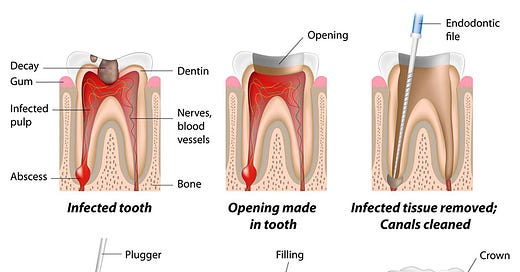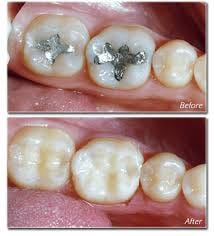The Truth About Conventional vs. Biological Dentistry: What’s Really in Your Dental Work?
Curious about what’s really in your dental work? Learn how conventional and biological dentistry differ in materials and techniques—and why your choice could impact your whole-body health!
Let’s be real—dentistry has come a long way, but not all dental practices have our whole health in mind. Conventional and biological dentistry take very different approaches, especially when it comes to materials and procedures. While conventional dentistry often addresses immediate dental concerns, biological dentistry treats the mouth as part of the body’s entire ecosystem. Here’s a closer look at what sets biological dentistry apart and why it might be a better choice for long-term health.
What is Biological Dentistry, Anyway?
Biological dentistry, also known as holistic or integrative dentistry, goes beyond addressing isolated dental issues like cavities or gum disease. Instead, it treats oral health as a critical part of the body’s entire ecosystem. Unlike conventional dentistry, which focuses on immediate dental concerns, biological dentistry considers how dental treatments and materials impact overall health, emphasizing the connection between the mouth and the rest of the body.
Biological dentistry goes beyond just “fixing teeth”; it’s about choosing materials and methods that respect the body’s natural processes. By prioritizing biocompatible materials, biological dentistry reduces the risk of inflammation and adverse reactions, supporting not only oral health but also the body’s overall balance. This approach recognizes that what goes into your mouth impacts your whole system, making it a smarter, more holistic choice for long-term wellness.
The Mercury Problem: Amalgam Fillings vs. Composite Fillings
A major difference between conventional and biological dentistry is the choice of filling materials. Conventional dentistry often still relies on amalgam fillings, commonly known as “silver fillings,” which are composed of about 50% mercury—a known neurotoxin. The issue is that mercury can release toxic vapors over time, which you may inhale or absorb, posing potential long-term health risks. Research has raised concerns about mercury’s effects on the nervous system and other parts of the body.
Biological dentists avoid mercury-based amalgams entirely, using biocompatible materials like composite resin. These materials are not only mercury-free but also reduce the risk of inflammation and toxicity. Dr. Kelly Blodgett, a well-regarded biological dentist in Portland, advocates strongly for safer materials, saying, “Our bodies are extremely sensitive to toxins, especially when placed in the mouth. Choosing materials that are biocompatible reduces the risk of inflammation and other health issues.” If you currently have mercury fillings, it may be worth exploring safe removal options to prevent long-term health effects.
The Root Canal Debate: Are They Safe?
Root canals are one of the most debated procedures between conventional and biological dentistry. Conventional dentistry views root canals as a reliable solution to save an infected or damaged tooth by removing the pulp, cleaning the area, and sealing it off. This approach leaves the tooth in place but with no living tissue inside. While this may seem like a safe fix, biological dentists argue that it introduces a host of potential health risks.
One primary concern is that the tooth, although “sealed,” is now technically a dead structure in the body. Dr. Gerry Curatola explains, “A dead tooth in the body is like having a foreign object, which can lead to chronic infection and inflammation.” The sealed environment created by a root canal can become an ideal space for anaerobic bacteria to thrive, as there is no longer any blood flow or immune defense within the tooth. These bacteria can release toxins that seep into surrounding tissues and even enter the bloodstream, potentially causing a variety of systemic health issues.
Studies show that bacteria can remain trapped in root-canaled teeth, potentially straining the immune system and complicating the body’s natural detoxification processes. Research in The Journal of Endodontics has even connected these bacteria to broader health concerns, including cardiovascular and systemic conditions. Essentially, a root-canaled tooth, now a “dead” structure, creates an environment where certain bacteria can thrive, releasing toxins that may spread to other parts of the body over time. As Dr. Kelly Blodgett, a leading advocate for biological dentistry, explains, “Our oral health impacts immunity, digestion, and even cardiovascular health. Choosing materials and methods that support the body’s natural balance is essential.”
To reduce these risks, many biological dentists prefer alternative approaches, such as carefully performed extractions combined with natural healing methods rather than root canals. By supporting the healing process with materials such as bone grafts or platelet-rich plasma, they help create a cleaner, healthier space that supports the body’s balance. This approach minimizes lingering bacteria and promotes a healthier environment for long-term wellness.
Materials Matter: Choosing Biocompatible Options
Biological dentists prioritize materials that align with the body’s natural balance and reduce potential health risks. This approach goes beyond avoiding mercury and root canals; it includes a careful selection of safe, compatible options for all dental treatments.
Fluoride Alternatives: Concerned about fluoride’s potential toxicity, biological dentists often avoid it, particularly when ingested over long periods. Instead, they use hydroxyapatite, a mineral that helps remineralize and strengthen enamel without fluoride’s associated risks.
Zirconia Implants Over Titanium: Conventional titanium implants, while durable, may cause inflammatory reactions in certain individuals, as titanium particles can accumulate in surrounding tissues, potentially triggering immune responses. Biological dentists prefer zirconia implants, a non-metallic, biocompatible ceramic alternative less likely to cause inflammation or interfere with the body’s natural energy fields, providing a safer, holistic option for long-term health.
Natural Antimicrobials: To support oral health and maintain a balanced microbiome, biological dentists often favor natural antimicrobials, such as ozone and herbal rinses, instead of harsh antiseptics. These alternatives effectively reduce harmful bacteria while preserving the mouth’s beneficial bacteria.
Through these choices, biological dentistry emphasizes treatments that work in harmony with the body, offering patients safer and more holistic care.
Working with Leading Biological Dentists
I personally work closely with Dr. Jeannie Grecco at Rejuvenation Dentistry in NYC, where she and the team emphasize whole-body health through oral care. Dr. Grecco’s approach aligns with the principles of biological dentistry, focusing on biocompatible materials and treatments that respect the body’s natural balance.
It’s essential to do your own research when seeking out holistic or biological dental care. Not every dentist who markets themselves as “holistic” or “biological” follows the same rigorous standards, so finding the right provider can make all the difference. A truly skilled biological dentist will prioritize safe, biocompatible materials and comprehensive, health-conscious approaches to care. Trusted experts I often refer patients to include Dr. Kelly Blodgett in Oregon, Dr. Carlo Litano in Florida, and Dr. Grecco and Dr. Curatola at Rejuvenation Dentistry in NYC. These professionals specialize in safe, well-researched approaches to care, including techniques for safely removing mercury amalgams and alternatives to traditional root canals, always ensuring the patient's overall health remains a priority.
The Takeaway
Biological dentistry isn’t just about avoiding certain materials or procedures; it’s a comprehensive approach that considers the impact of every dental decision on your body as a whole. From choosing biocompatible materials to rethinking root canals, biological dentistry provides a safer, more holistic path toward health and wellness. If you’re interested in exploring this approach, I encourage you to consult with a biological dentist and consider the long-term health benefits.
If you enjoyed this topic, there’s more to explore! My RootedWell Advanced course, launching in December, features a spotlight on biological dentistry, including interviews with top biological dentists. Stay tuned for details!
❤️ Keep Learning,
Aleena
References
American Dental Association. "Dental Amalgam: What Others Say." ADA.org. Retrieved from
https://www.ada.org
(accessed October 2024).
Weston A. Price Foundation. “Root Canal Dangers.” Retrieved from
https://www.westonaprice.org
(accessed October 2024).
Eley, B. M. (1997). "The future of dental amalgam: A review of the literature. Part 1: Background, mercury toxicity and bioavailability." British Dental Journal, 182(7), 247–255. Available at PubMed.
Hahn, C. L., & Liewehr, F. R. (2007). "Innate immune responses of the dental pulp to caries." Journal of Endodontics, 33(6), 643-651. Available at PubMed.
Richardson, G. M., & Allan, M. J. (1996). "A Monte Carlo assessment of the uncertainty of the Canadian population health risks of dental amalgam." Human & Ecological Risk Assessment, 2(4), 709-738. Available at PubMed.






Very informative article!
Do you know a biological dentist in Texas?
Is there a trusted list of biological dentists in the US?
Thanks!